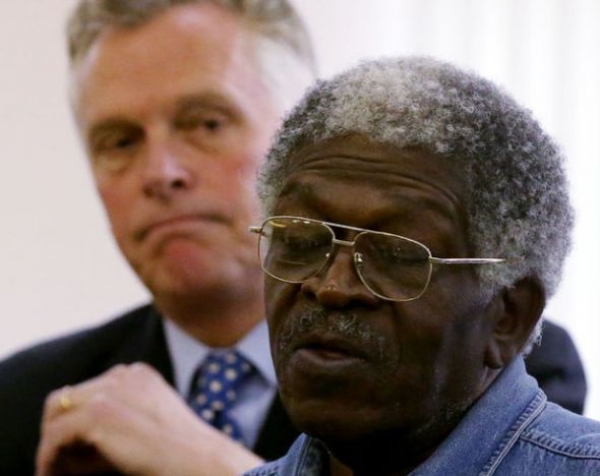“Those are tears of joy,” observed Gov. Terry McAuliffe, who came to First Baptist Church in South Richmond on Thursday to formally restore the rights of Ray and two others.
The governor was commemorating a year in which the secretary of the commonwealth’s office restored the rights of 5,113 Virginians to vote, serve on a jury, hold public office and become notaries.
The McAuliffe administration said that is a record for a governor’s first year in office.
“This is a great day in my life,” said Ray, convicted in 2005 of a nonviolent felony. He received an official proclamation from the governor along with LaQuita Fairley and Verneda Muhammad.
“This is what’s great about being governor,” said McAuliffe, who became a little emotional himself at seeing Ray’s reaction.
“I’ve said many times I think it’s important that everybody in life gets a second chance,” the governor told the audience of parishioners, politicians and rights restoration advocates. They cheered and applauded frequently throughout the event as officials and former offenders alike told of trying to restore civil rights — and the impact restoration will have on their lives.
“We want to move on and provide all of our Virginians with a pathway to success,” added the governor, who called his administration’s expedited process “the right thing to do. The state should allow them the opportunity to become contributing members of our society.”
Virginia has historically been among the most restrictive states in the nation in returning civil rights to former offenders, requiring felons to go through a waiting period and a detailed application process even after they have served their time.
Only the governor can restore civil rights to felons, and attempts over the years to amend the Virginia Constitution to allow automatic restoration have failed. Nonviolent felons do not have to wait to apply for their rights to be restored once they have served their time and paid fines and restitution.
After putting his political weight behind a constitutional amendment for nonviolent felons, then-Gov. Bob McDonnell took significant administrative steps to accelerate review and approval of applications during his four-year term, which ended with a record 8,163 people with rights restored.
This year, Secretary of the Commonwealth Levar Stoney spearheaded the governor’s effort to increase the number by removing drug crimes from the list of felony offenses that require a waiting period before applying for reinstatement.
For those convicted of more serious offenses, the administration also reduced the waiting period to three years from five years after the offender has served his time and paid fines and restitution.
The administration also whittled down the application from 13 notarized pages, with letters of recommendation, to a single page.
“By providing Virginia’s former offenders with a second chance, we can reduce recidivism, increase participation in our democratic processes, and build a new Virginia economy,” McAuliffe said.
Evidence of participation can be found in the actions of many of those whose rights were restored over the last year. McAuliffe said 3,577 of the 5,113 people whose rights were restored have registered to vote.
The governor told the audience that his goal is to restore rights to thousands more Virginians by the end of his term. “I’m only 11 months in office,” he said. “We’re just starting.”
Link to original article from The Richmond Times Dispatch


 Imagine going to the polls on Election Day and discovering that your ballot could be collected and reviewed by the
Imagine going to the polls on Election Day and discovering that your ballot could be collected and reviewed by the ACLU Blueprints Offer Vision to Cut US Incarceration Rate in Half by Prioritizing 'People Over Prisons'
ACLU Blueprints Offer Vision to Cut US Incarceration Rate in Half by Prioritizing 'People Over Prisons'  "These disasters drag into the light exactly who is already being thrown away," notes Naomi Klein
"These disasters drag into the light exactly who is already being thrown away," notes Naomi Klein  How about some good news? Kansas Democratic Representative advances bill for Native Peoples.
How about some good news? Kansas Democratic Representative advances bill for Native Peoples.  What mattered was that he showed up — that he put himself in front of the people whose opinions on
What mattered was that he showed up — that he put himself in front of the people whose opinions on On a night of Democratic victories, one of the most significant wins came in Virginia, where the party held onto
On a night of Democratic victories, one of the most significant wins came in Virginia, where the party held onto A seismic political battle that could send shockwaves all the way to the White House was launched last week in
A seismic political battle that could send shockwaves all the way to the White House was launched last week in In an interview with Reuters conducted a month after he took office, Donald Trump asserted that the U.S. had “fallen
In an interview with Reuters conducted a month after he took office, Donald Trump asserted that the U.S. had “fallen Attorney General Jeff Sessions overturned the sweeping criminal charging policy of former attorney general Eric H. Holder Jr. and directed
Attorney General Jeff Sessions overturned the sweeping criminal charging policy of former attorney general Eric H. Holder Jr. and directed